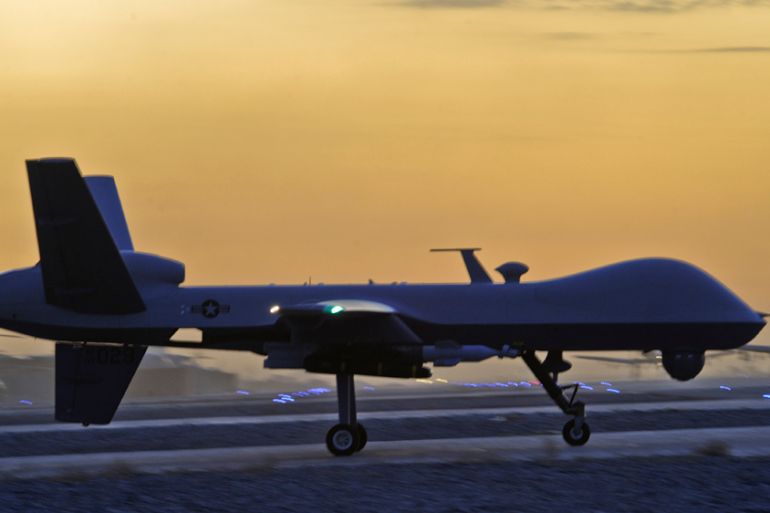Journalists allege threat of drone execution by US
Fearing assassination, Al Jazeera’s Ahmad Zaidan and independent journalist Bilal Abdul Kareem file US legal complaint.

Washington, DC – Two journalists who say they have been targeted by the United States have filed a complaint against the American government, accusing it of putting them on a “kill list” and demanding to be taken off it.
The complaint was filed in the US District Court of the District of Columbia on Thursday on behalf of Ahmad Muaffaq Zaidan – a dual Pakistani-Syrian citizen who works for Al Jazeera and Bilal Abdul Kareem, an American, who has occasionally contributed to Al Jazeera and other media organisations.
Keep reading
list of 4 itemsPalestinian Prisoner’s Day: How many are still in Israeli detention?
‘Mama we’re dying’: Only able to hear her kids in Gaza in their final days
Europe pledges to boost aid to Sudan on unwelcome war anniversary
It accuses the US government of using information gathered via its Skynet surveillance programme, which has been used to guide drone strikes on “terror suspects”.
The plaintiffs accuse the United States of conspiracy to commit murder outside its borders and violating international law on targeting civilians.
Filed by UK-based rights group Reprieve and the Washington DC-based law firm Lewis Baach, the complaint asks the court to declare the journalists’ inclusion on the list illegal, and issue an injunction removing their names until they can review the secret evidence against them. It also asks the US to cease any planned strikes against the plaintiffs.
WATCH: The future of mass surveillance
Clive Stafford Smith, Reprieve’s founder and director, said the timing of the filing is linked to information his organisation has received from a secret source in Turkey who claims an attempt on Abdul Kareem’s life is imminent.
“We know they’re targeting Bilal and we’ve got to intimidate them enough, through publicity, to prevent them from doing this,” said Stafford Smith.
He told Al Jazeera there is no doubt the men are on the list of targets the US government is going after.
“When you look at Ahmad Zaidan … we have a copy of their [US] leaked Power Point saying he’s on the list. So that’s pretty powerful,” Stafford Smith said.
He said the case of Abdul Kareem is “even stronger”, as the US has allegedly targeted him several times before.
“The reason we know that is that three of those strikes, at least, maybe more, were drones, and the only country that had weaponised drones at the time was the US,” said Stafford Smith.
Audio above: Lawyer Kate Toomey explains the case of Ahmad Zaidan and Bilal Abdul Kareem
According to Reprieve’s research, it is not uncommon for the US’ drone programme to require several attempts before killing a target, even ones such as Abdul Kareem or Zaidan who are not in hiding.
“The US misses on average three times for each person they’re trying to target. And with some people as many as nine or 10 times … Even a cat has only nine lives,” Stafford Smith said.
Named after the artificial intelligence system in the Terminator movies, Skynet uses metadata – such as geolocation and social media activity – to flag individuals as potential “terrorist” threats, placing them on the so-called kill list – also referred to as the “disposition matrix” in the complaint.
“When you use an algorithm, it sounds very fancy, but an algorithm carries with it all the biases of the person who wrote it … This is the same problem with Skynet,” said Stafford Smith.
“The people who are really the ‘bad dudes’ out there, like Osama bin Laden, are not tweeting to anyone – they’re not sending text messages to [current al-Qaeda chief] Ayman al-Zawahiri.”
The sort of activities carried out by reporters in the normal course of doing their job, he said, is essentially what landed both men on the kill list.
Over the course of his career, Zaidan has interviewed senior leaders of groups listed as “terrorist” organisations by the US, including former al-Qaeda leader Osama bin Laden and Abu Mohammad al-Jolani, head of the group formerly known as al-Nusra Front in Syria. He served as Al Jazeera Arabic’s bureau chief in Pakistan for many years and is now an executive producer of programmes.
In a document leaked in 2015, the US National Security Agency alleged that Zaidan was a member of al-Qaeda and the Muslim Brotherhood – allegations that he countered in an op-ed detailing his meetings with members of al-Qaeda and other groups.
Abdul Kareem was one of the few independent journalists reporting from the ground during the battle for Syria’s Aleppo last year for a number of outlets, including Al Jazeera. He has also interviewed members of the Syrian al-Qaeda affiliate in rebel-held areas.
WATCH: Headliner: Ex-CIA director on torture and drones
The complaint filed on Thursday stated: “Neither Zaidan nor Kareem pose a continuing, imminent threat to US persons or national security. Neither Zaidan nor Kareem is a member or supporter of any terrorist group. Inclusion of Zaidan and Kareem on the kill list under these circumstance was arbitrary and capricious, and an abuse of discretion.”
In Abdul Kareem’s case, being targeted also violates his constitutional rights under the Fourth Amendment – prohibiting illegal seizure of evidence, in this case, data – as well as the Fifth Amendment, which guarantees US citizens due process.
The complaint has been filed against President Donald Trump, the Department of Defense, Department of Homeland Security, Department of Justice, the CIA, as well as several security-related agency and department heads.
Requests for comment were not responded to by the time of publication.
Follow @dparvaz on Twitter
|
|